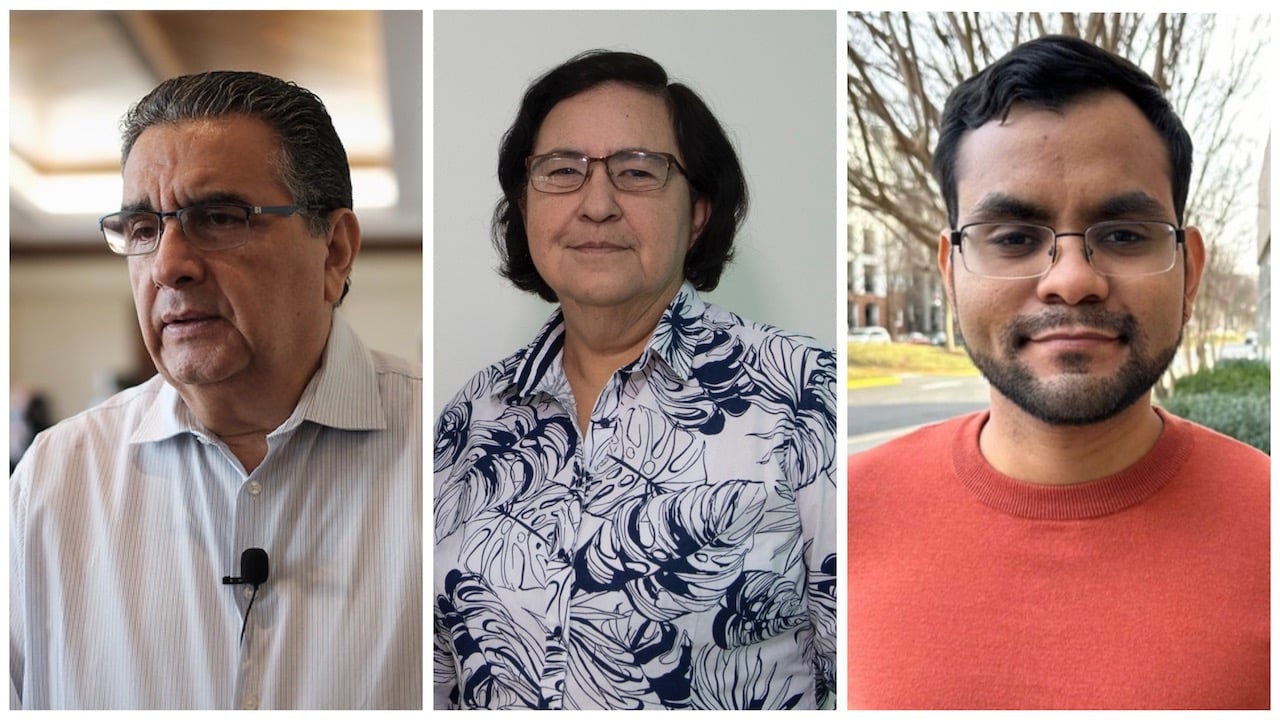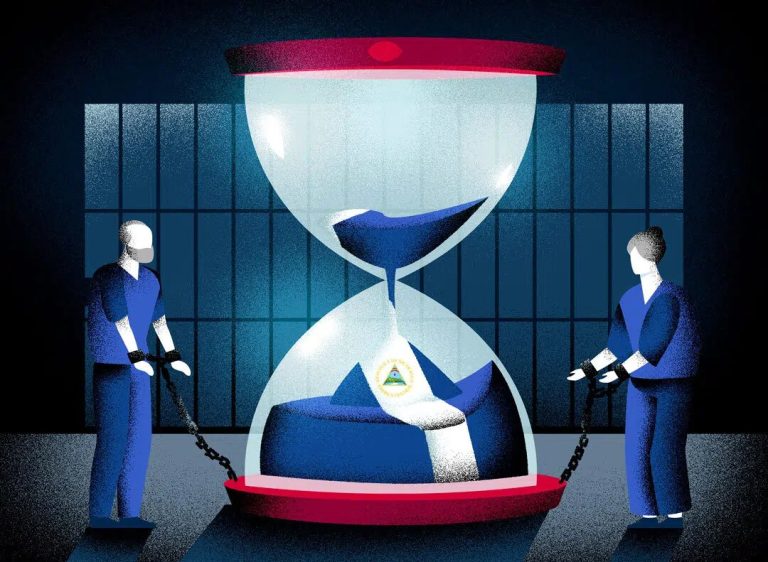1 de marzo 2022

Dialogue and Elections: “The Peaceful Way Out of the Dictatorship”

PUBLICIDAD 1M
PUBLICIDAD 4D
PUBLICIDAD 5D
Isolated in their own homes, without telephones or any means of communication; nevertheless, they now have access to better nutrition and family visits

The 177 political prisoners in jail today symbolize national dignity and the hope for democratic change in Nicaragua
When political prisoners Arturo Cruz and Jose Pallais, both 68, had their “trials” on February 21st, police officials arrived at their homes early to take them to the El Chipote jail. There, they were once again forced to enter a cell and don the dark blue jail scrubs. The authorities have made this uniform an emblem of the political opposition that - since 2018 - the Ortega regime has branded as “terrorist”.
The Nicaraguan Center for Human Rights (Cenidh) characterized the manner in which the authorities treated former presidential hopeful Cruz and former deputy Pallais as “degrading” and demanded freedom for the 177 political prisoners jailed by the regime of Daniel Ortega and Rosario Murillo. At the same time, Cenidh noted that just three days before, Cruz and Pallais were finally transferred to house arrest. The new measure allowed the two older prisoners to go home, following eight long months in a jail cell.
The two are far from free, however. This past week a judge declared them guilty of the supposed crime of “conspiracy to undermine the national integrity.” The trial stretched into marathon sessions that lasted a full week, although the only evidence presented against them - and another five accused dissidents - was police testimony, plus their participation in a WhatsApp group the prosecution claimed was used to “conspire”.
Although they are no longer being subjected to the brutal treatment of the El Chipote jail cells, sources acquainted with house arrest protocols explained they’ll still be subjected to near-total isolation in their homes. They don’t have cable service; they can’t watch television or have access to the Internet; they can’t use any kind of phone or computer; and all electronic devices that would allow them to communicate with the outside world are prohibited. They’re completely cut off,” the source confirmed.
Confidencial has learned that the prisoners’ lawyers are not allowed contact with their clients, not even when they’ve been transferred to their residences. The home prisoners aren’t even permitted to get some sunlight in the outdoor courtyards of their homes, although they’re allowed to move around the home.”
However, the main contrast between house arrest and their pre-trial imprisonment is that in their own homes the prisoners of conscience have access to their own food, and to the care of their families. Relatives are permitted one-hour daily visits, instead of the very infrequent and irregular visits they received in jail. Family members living in the prisoner’s home can leave for time periods stipulated by the Police, but when they reenter the home, the officials prevent them from entering with their cell phones.
Under Nicaragua’s Criminal Processing Code, house arrest can be granted under two circumstances. An accused prisoner can be put in the custody of someone who assumes responsibility for them, assuring they won’t flee; there’s also a provision that allows it to be imposed in substitution for a prison term.
The United Nations has established the “Nelson Mandela Rules: Standard Minimum Rules for the Treatment of Prisoners.” These rules state that all those detained should be treated with respect for their dignity, and not be subjected to cruel punishment or inhumane and degrading treatment. It’s the government’s responsibility to provide medical care to those detained. They must also guarantee that the prisoners’ windows are large enough to permit them to read; the artificial light should also be bright enough to allow for this activity. These are just a few among other rights the UN considers universal.
There are currently 177 prisoners of conscience in Nicaragua, according to the available mechanisms for recognizing those detained for political reasons. Of these 177, nine are currently under house arrest. One of them is former presidential hopeful Cristiana Chamorro Barrios, 68, whose charges in connection with the Violeta Barrios de Chamorro Foundation have been reactivated by the Prosecution, and her trial scheduled to begin March 3rd at 8:30 am.
Similar house arrest protocols were initially granted to political commentator Jaime Arrellano, 62 years old; former Liberal Party deputy Maria Fernanda Flores, 54; and yet another aspiring presidential candidate, Noel Vidaurre, 66.
Following the national and international impact caused by the February 11th death of retired General Hugo Torres, 73, while in jail, the regime’s authorities ordered the change in detention protocol for Arturo Cruz, Jose Pallais, and former foreign minister Francisco Aguirre Sacasa. On February 24, the list was expanded to include former ambassadors Edgar Parrales and Mauricio Diaz. Relatives and human rights organizations had denounced signs of worsening health in all these cases.
Attorneys consulted by Confidencial insisted on the innocence of all the political prisoners. What should be happening is the annulment of all the trials and the immediate and unconditional liberation of all the political prisoners. Meanwhile, these lawyers explained, the government is responsible for the health of the prisoners, whether they’re in the El Chipote jail, the penitentiary system, or confined to their homes.
Alexandra Salazar is a member of United Legal Defense, a group of attorneys specialized in human rights who have been defending the political prisoners since 2018. She explained that house arrest is technically a measure that substitutes for prison time, according to the Criminal Processing Code.
Salazar questioned the “total lack of communication” that these prisoners are subjected to in their homes, under custody of a “broad police guard”. “We understand that they took away their internet, access to landline or cell phones, and the family members around them are also being held incommunicado. Those sanctions on the family members shouldn’t exist,” the legal expert stated.
Salazar asserted that given the defense lawyers lack of access to the legal files, the criteria the judges used to apply the change of protocol can’t be known with any precision. The only version of this decision appears in statements from the District Attorney’s Office, where they cite “humanitarian reasons”.
The relatives of the prisoners of conscience have insisted that all the older adults arrested – 21 of them up until February 18 – should be given a medical check. However, that’s not currently happening.
“Several of the people being held in El Chipote aren’t in appropriate condition to be in a jail cell. They should have been granted alternative protocols such as house arrest. In several cases, they’re been issues of poor health and the authorities have neglected to respond,” Salazar lamented.
Former departmental prosecutor Boanerges Fornos insists on the urgency and importance of access to medical attention for those under house arrest. This, he points out, is a right.
“Since these citizens are still legally classed as defendants, they should be able to access medical care. This may possibly not involve moving them to another place, but a doctor could come visit them in their residence. Then, if any further studies are required, they should be taken to a medical center. The judge shouldn’t refuse them the possibility of being moved for that reason,” Fornos maintains.
As the former prosecutor sees it, when a justice system is functioning correctly, a simple request to the judge should be sufficient for this, beginning with the forensic medical evaluation. However, what seems to be occurring in the country is the denial of such petitions, or a failure on the part of the forensic medical personnel to carry out the check-ups. Those occurrences mean they’re denying the [prisoners’] right to health care in order to follow “instructions”.
However, Fornos notes, in contrast with the prisoners of conscience in El Chipote, those under house arrest do have access to a more balanced diet and the care of their families. He adds that those things can’t be restricted under any point of view. In the same way, they should be able to meet with their lawyers without restrictions. He recognizes however, that in these areas also, the behavior of the authorities could be “arbitrary”.
“The State’s responsibility remains the same, even when a prisoner is under house arrest. The detained should have guaranteed access to a doctor and to medicine. In terms of food, there’s not as much (government responsibility), because the family is the one providing their food. But the area of health, access to hospitalization when needed, is the government’s responsibility, as well as their right to physical integrity and to life,” the legal expert underlines.
This article was originally published in Spanish in Confidencial and translated by Havana Times
PUBLICIDAD 3M
Confidencial es un diario digital nicaragüense, de formato multimedia, fundado por Carlos F. Chamorro en junio de 1996. Inició como un semanario impreso y hoy es un medio de referencia regional con información, análisis, entrevistas, perfiles, reportajes e investigaciones sobre Nicaragua, informando desde el exilio por la persecución política de la dictadura de Daniel Ortega y Rosario Murillo.
PUBLICIDAD 3D